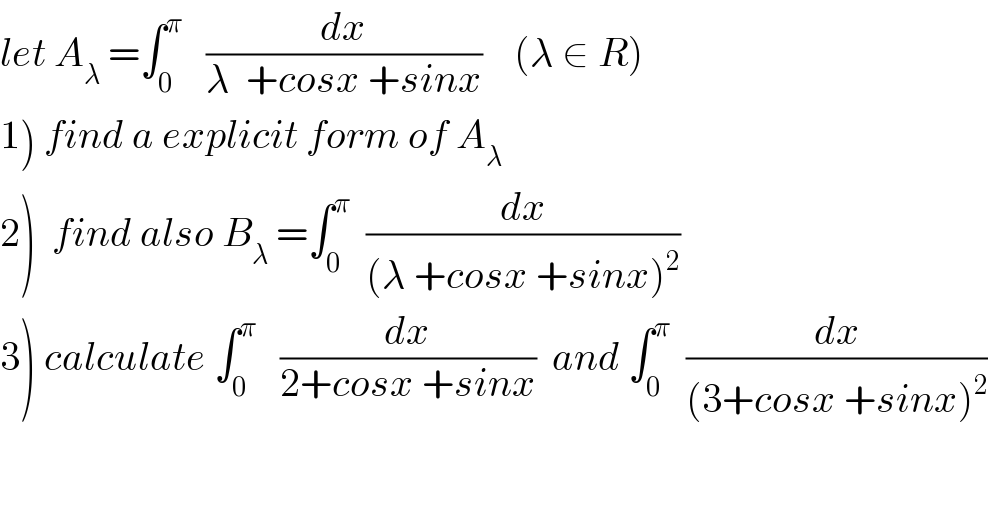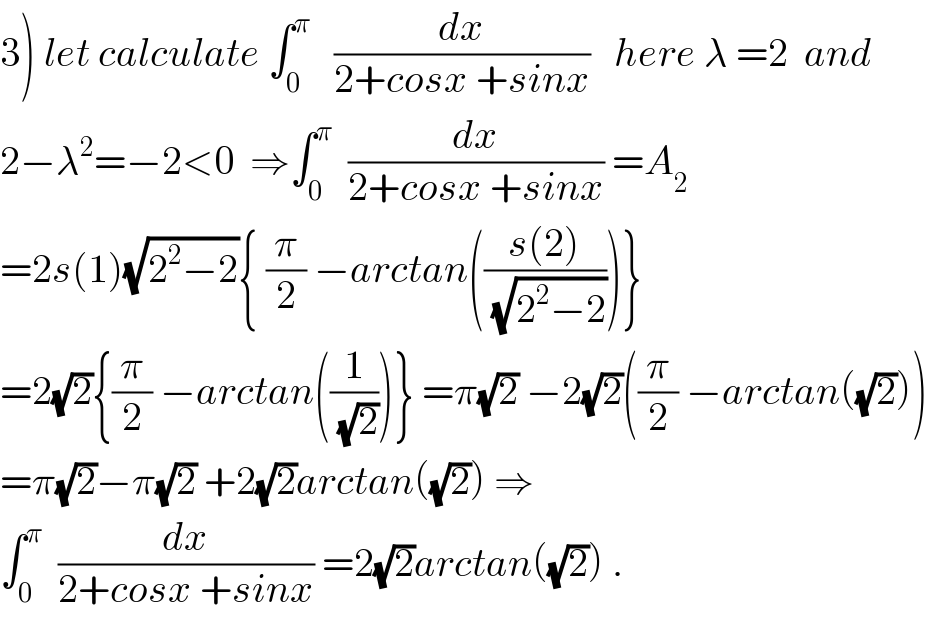
Question Number 64850 by mathmax by abdo last updated on 22/Jul/19

$${let}\:{A}_{\lambda} \:=\int_{\mathrm{0}} ^{\pi} \:\:\:\frac{{dx}}{\lambda\:\:+{cosx}\:+{sinx}}\:\:\:\:\left(\lambda\:\in\:{R}\right) \\ $$$$\left.\mathrm{1}\right)\:{find}\:{a}\:{explicit}\:{form}\:{of}\:{A}_{\lambda} \\ $$$$\left.\mathrm{2}\right)\:\:{find}\:{also}\:{B}_{\lambda} \:=\int_{\mathrm{0}} ^{\pi} \:\:\frac{{dx}}{\left(\lambda\:+{cosx}\:+{sinx}\right)^{\mathrm{2}} } \\ $$$$\left.\mathrm{3}\right)\:{calculate}\:\int_{\mathrm{0}} ^{\pi} \:\:\:\frac{{dx}}{\mathrm{2}+{cosx}\:+{sinx}}\:\:{and}\:\int_{\mathrm{0}} ^{\pi} \:\:\frac{{dx}}{\left(\mathrm{3}+{cosx}\:+{sinx}\right)^{\mathrm{2}} } \\ $$
Commented by mathmax by abdo last updated on 23/Jul/19
![1) A_λ =∫_0 ^π (dx/(λ +cosx +sinx)) changement tan((x/2))=t give A_λ =∫_0 ^∞ (1/(λ +((1−t^2 )/(1+t^2 )) +((2t)/(1+t^2 )))) ((2dt)/(1+t^2 )) =∫_0 ^∞ ((2dt)/(λ+λt^2 +1−t^2 +2t)) =2∫_0 ^∞ (dt/((λ−1)t^2 +2t +1+λ)) let decompose F(t)=(1/((λ−1)t^2 +2t+1+λ)) Δ^′ =1−(λ−1)(λ+1) =1−(λ^2 −1) =2−λ^2 case 1 2−λ^2 >0 ⇒∣λ∣<(√2) ⇒t_1 =((−1+(√(2−λ^2 )))/(λ−1)) (λ≠1) t_2 =((−1−(√(2−λ^2 )))/(λ−1)) ⇒F(t) =(1/((λ−1)(t−t_1 )(t−t_2 ))) ⇒ A_λ =(2/(λ−1))∫_0 ^∞ (1/((2(√(2−λ^2 )))/(λ−1))) ((1/(t−t_1 )) −(1/(t−t_2 )))dt =(1/(√(2−λ^2 )))∫_0 ^∞ ((1/(t−t_1 ))−(1/(t−t_2 )))dt =(1/(2(√(2−λ^2 ))))[ln∣((t−t_1 )/(t−t_2 ))∣]_0 ^(+∞) =(1/(2(√(2−λ^2 ))))ln∣(t_2 /t_1 )∣ A_λ =(1/(2(√(2−λ^2 ))))ln∣((1+(√(2−λ^2 )))/(1−(√(2−λ^2 ))))∣](Q64995.png)
$$\left.\mathrm{1}\right)\:{A}_{\lambda} =\int_{\mathrm{0}} ^{\pi} \:\:\frac{{dx}}{\lambda\:+{cosx}\:+{sinx}}\:\:{changement}\:{tan}\left(\frac{{x}}{\mathrm{2}}\right)={t}\:{give} \\ $$$${A}_{\lambda} =\int_{\mathrm{0}} ^{\infty} \:\:\:\:\:\:\:\frac{\mathrm{1}}{\lambda\:+\frac{\mathrm{1}−{t}^{\mathrm{2}} }{\mathrm{1}+{t}^{\mathrm{2}} }\:+\frac{\mathrm{2}{t}}{\mathrm{1}+{t}^{\mathrm{2}} }}\:\frac{\mathrm{2}{dt}}{\mathrm{1}+{t}^{\mathrm{2}} }\:=\int_{\mathrm{0}} ^{\infty} \:\:\:\:\frac{\mathrm{2}{dt}}{\lambda+\lambda{t}^{\mathrm{2}} \:+\mathrm{1}−{t}^{\mathrm{2}} \:+\mathrm{2}{t}} \\ $$$$=\mathrm{2}\int_{\mathrm{0}} ^{\infty} \:\:\:\frac{{dt}}{\left(\lambda−\mathrm{1}\right){t}^{\mathrm{2}} \:+\mathrm{2}{t}\:+\mathrm{1}+\lambda}\:\:{let}\:{decompose}\:{F}\left({t}\right)=\frac{\mathrm{1}}{\left(\lambda−\mathrm{1}\right){t}^{\mathrm{2}} \:+\mathrm{2}{t}+\mathrm{1}+\lambda} \\ $$$$\Delta^{'} \:=\mathrm{1}−\left(\lambda−\mathrm{1}\right)\left(\lambda+\mathrm{1}\right)\:=\mathrm{1}−\left(\lambda^{\mathrm{2}} −\mathrm{1}\right)\:=\mathrm{2}−\lambda^{\mathrm{2}} \\ $$$${case}\:\mathrm{1}\:\:\mathrm{2}−\lambda^{\mathrm{2}} >\mathrm{0}\:\Rightarrow\mid\lambda\mid<\sqrt{\mathrm{2}}\:\Rightarrow{t}_{\mathrm{1}} =\frac{−\mathrm{1}+\sqrt{\mathrm{2}−\lambda^{\mathrm{2}} }}{\lambda−\mathrm{1}}\:\:\:\:\:\left(\lambda\neq\mathrm{1}\right) \\ $$$${t}_{\mathrm{2}} =\frac{−\mathrm{1}−\sqrt{\mathrm{2}−\lambda^{\mathrm{2}} }}{\lambda−\mathrm{1}}\:\Rightarrow{F}\left({t}\right)\:=\frac{\mathrm{1}}{\left(\lambda−\mathrm{1}\right)\left({t}−{t}_{\mathrm{1}} \right)\left({t}−{t}_{\mathrm{2}} \right)}\:\Rightarrow \\ $$$${A}_{\lambda} =\frac{\mathrm{2}}{\lambda−\mathrm{1}}\int_{\mathrm{0}} ^{\infty} \:\:\:\frac{\mathrm{1}}{\frac{\mathrm{2}\sqrt{\mathrm{2}−\lambda^{\mathrm{2}} }}{\lambda−\mathrm{1}}}\:\left(\frac{\mathrm{1}}{{t}−{t}_{\mathrm{1}} }\:−\frac{\mathrm{1}}{{t}−{t}_{\mathrm{2}} }\right){dt}\:=\frac{\mathrm{1}}{\sqrt{\mathrm{2}−\lambda^{\mathrm{2}} }}\int_{\mathrm{0}} ^{\infty} \:\:\:\left(\frac{\mathrm{1}}{{t}−{t}_{\mathrm{1}} }−\frac{\mathrm{1}}{{t}−{t}_{\mathrm{2}} }\right){dt} \\ $$$$=\frac{\mathrm{1}}{\mathrm{2}\sqrt{\mathrm{2}−\lambda^{\mathrm{2}} }}\left[{ln}\mid\frac{{t}−{t}_{\mathrm{1}} }{{t}−{t}_{\mathrm{2}} }\mid\right]_{\mathrm{0}} ^{+\infty} \:=\frac{\mathrm{1}}{\mathrm{2}\sqrt{\mathrm{2}−\lambda^{\mathrm{2}} }}{ln}\mid\frac{{t}_{\mathrm{2}} }{{t}_{\mathrm{1}} }\mid \\ $$$${A}_{\lambda} =\frac{\mathrm{1}}{\mathrm{2}\sqrt{\mathrm{2}−\lambda^{\mathrm{2}} }}{ln}\mid\frac{\mathrm{1}+\sqrt{\mathrm{2}−\lambda^{\mathrm{2}} }}{\mathrm{1}−\sqrt{\mathrm{2}−\lambda^{\mathrm{2}} }}\mid \\ $$
Commented by mathmax by abdo last updated on 23/Jul/19
![case 2 2−λ^2 <0 ⇒∣λ∣>(√2) ⇒Δ^′ <0 and (λ−1)t^2 +2t +1+λ =(λ−1){t^2 +(2/(λ−1))t +((1+λ)/(λ−1))} =(λ−1){ t^2 +((2t)/(λ−1)) +(1/((λ−1)^2 )) +((1+λ)/(λ−1)) −(1/((λ−1)^2 ))} =(λ−1){ (t +(1/(λ−1)))^2 +((λ^2 −2)/((λ−1)^2 ))} we use the changement t+(1/(λ−1)) =((√(λ^2 −2))/(∣λ−1∣)) u ⇒A_λ =(2/(λ−1))∫_0 ^∞ (dt/((t+(1/(λ−1)))^2 +((λ^2 −2)/((λ−1)^2 )))) =(2/(λ−1))∫_((s(λ))/(√(λ^2 −2))) ^(+∞) (1/(((λ^2 −2)/((λ−1)^2 ))(1+u^2 )))((√(λ^2 −2))/(∣λ−1∣)) du =((2(λ−1)^2 )/((λ−1)∣λ−1∣)) (√(λ^2 −2)) [arctanu]_((s(λ))/(√(λ^2 −2))) ^(+∞) A_λ =2s(λ−1)(√(λ^2 −2)) ((π/2) −arctan(((s(λ))/(√(λ^2 −2))))) with s(x) =1 if x>0 and s(x)=−1 if x<0](Q64996.png)
$${case}\:\mathrm{2}\:\:\mathrm{2}−\lambda^{\mathrm{2}} <\mathrm{0}\:\Rightarrow\mid\lambda\mid>\sqrt{\mathrm{2}}\:\Rightarrow\Delta^{'} <\mathrm{0}\:{and} \\ $$$$\left(\lambda−\mathrm{1}\right){t}^{\mathrm{2}} \:+\mathrm{2}{t}\:+\mathrm{1}+\lambda\:=\left(\lambda−\mathrm{1}\right)\left\{{t}^{\mathrm{2}} \:+\frac{\mathrm{2}}{\lambda−\mathrm{1}}{t}\:\:+\frac{\mathrm{1}+\lambda}{\lambda−\mathrm{1}}\right\} \\ $$$$=\left(\lambda−\mathrm{1}\right)\left\{\:{t}^{\mathrm{2}} \:+\frac{\mathrm{2}{t}}{\lambda−\mathrm{1}}\:+\frac{\mathrm{1}}{\left(\lambda−\mathrm{1}\right)^{\mathrm{2}} }\:+\frac{\mathrm{1}+\lambda}{\lambda−\mathrm{1}}\:−\frac{\mathrm{1}}{\left(\lambda−\mathrm{1}\right)^{\mathrm{2}} }\right\} \\ $$$$=\left(\lambda−\mathrm{1}\right)\left\{\:\left({t}\:+\frac{\mathrm{1}}{\lambda−\mathrm{1}}\right)^{\mathrm{2}} \:+\frac{\lambda^{\mathrm{2}} −\mathrm{2}}{\left(\lambda−\mathrm{1}\right)^{\mathrm{2}} }\right\}\:{we}\:{use}\:{the}\:{changement}\: \\ $$$${t}+\frac{\mathrm{1}}{\lambda−\mathrm{1}}\:=\frac{\sqrt{\lambda^{\mathrm{2}} −\mathrm{2}}}{\mid\lambda−\mathrm{1}\mid}\:{u}\:\Rightarrow{A}_{\lambda} =\frac{\mathrm{2}}{\lambda−\mathrm{1}}\int_{\mathrm{0}} ^{\infty} \:\:\frac{{dt}}{\left({t}+\frac{\mathrm{1}}{\lambda−\mathrm{1}}\right)^{\mathrm{2}} \:+\frac{\lambda^{\mathrm{2}} −\mathrm{2}}{\left(\lambda−\mathrm{1}\right)^{\mathrm{2}} }} \\ $$$$=\frac{\mathrm{2}}{\lambda−\mathrm{1}}\int_{\frac{{s}\left(\lambda\right)}{\sqrt{\lambda^{\mathrm{2}} −\mathrm{2}}}} ^{+\infty} \:\:\:\:\:\:\:\frac{\mathrm{1}}{\frac{\lambda^{\mathrm{2}} −\mathrm{2}}{\left(\lambda−\mathrm{1}\right)^{\mathrm{2}} }\left(\mathrm{1}+{u}^{\mathrm{2}} \right)}\frac{\sqrt{\lambda^{\mathrm{2}} −\mathrm{2}}}{\mid\lambda−\mathrm{1}\mid}\:{du} \\ $$$$=\frac{\mathrm{2}\left(\lambda−\mathrm{1}\right)^{\mathrm{2}} }{\left(\lambda−\mathrm{1}\right)\mid\lambda−\mathrm{1}\mid}\:\sqrt{\lambda^{\mathrm{2}} −\mathrm{2}}\:\:\left[{arctanu}\right]_{\frac{{s}\left(\lambda\right)}{\sqrt{\lambda^{\mathrm{2}} −\mathrm{2}}}} ^{+\infty} \\ $$$${A}_{\lambda} =\mathrm{2}{s}\left(\lambda−\mathrm{1}\right)\sqrt{\lambda^{\mathrm{2}} −\mathrm{2}}\:\:\left(\frac{\pi}{\mathrm{2}}\:−{arctan}\left(\frac{{s}\left(\lambda\right)}{\sqrt{\lambda^{\mathrm{2}} −\mathrm{2}}}\right)\right) \\ $$$${with}\:{s}\left({x}\right)\:=\mathrm{1}\:{if}\:{x}>\mathrm{0}\:{and}\:{s}\left({x}\right)=−\mathrm{1}\:{if}\:{x}<\mathrm{0} \\ $$
Commented by mathmax by abdo last updated on 23/Jul/19

$$\left.\mathrm{2}\right)\:{we}\:{have}\:\frac{{dA}_{\lambda} }{{d}\lambda}\:=−\int_{\mathrm{0}} ^{\pi} \:\:\:\frac{{dx}}{\left(\lambda\:+{cosx}\:+{sinx}\right)^{\mathrm{2}} }\:=−{B}_{\lambda} \:\Rightarrow \\ $$$${B}_{\lambda} \:=−{A}_{\lambda} ^{'} \:\:\:\:\:\:{rest}\:{to}\:{calculate}\:{A}_{\lambda} ^{'} .... \\ $$
Commented by mathmax by abdo last updated on 23/Jul/19

$$\left.\mathrm{3}\right)\:{let}\:{calculate}\:\int_{\mathrm{0}} ^{\pi} \:\:\:\frac{{dx}}{\mathrm{2}+{cosx}\:+{sinx}}\:\:\:{here}\:\lambda\:=\mathrm{2}\:\:{and} \\ $$$$\mathrm{2}−\lambda^{\mathrm{2}} =−\mathrm{2}<\mathrm{0}\:\:\Rightarrow\int_{\mathrm{0}} ^{\pi} \:\:\frac{{dx}}{\mathrm{2}+{cosx}\:+{sinx}}\:={A}_{\mathrm{2}} \\ $$$$=\mathrm{2}{s}\left(\mathrm{1}\right)\sqrt{\mathrm{2}^{\mathrm{2}} −\mathrm{2}}\left\{\:\frac{\pi}{\mathrm{2}}\:−{arctan}\left(\frac{{s}\left(\mathrm{2}\right)}{\sqrt{\mathrm{2}^{\mathrm{2}} −\mathrm{2}}}\right)\right\} \\ $$$$=\mathrm{2}\sqrt{\mathrm{2}}\left\{\frac{\pi}{\mathrm{2}}\:−{arctan}\left(\frac{\mathrm{1}}{\sqrt{\mathrm{2}}}\right)\right\}\:=\pi\sqrt{\mathrm{2}}\:−\mathrm{2}\sqrt{\mathrm{2}}\left(\frac{\pi}{\mathrm{2}}\:−{arctan}\left(\sqrt{\mathrm{2}}\right)\right) \\ $$$$=\pi\sqrt{\mathrm{2}}−\pi\sqrt{\mathrm{2}}\:+\mathrm{2}\sqrt{\mathrm{2}}{arctan}\left(\sqrt{\mathrm{2}}\right)\:\Rightarrow \\ $$$$\int_{\mathrm{0}} ^{\pi} \:\:\frac{{dx}}{\mathrm{2}+{cosx}\:+{sinx}}\:=\mathrm{2}\sqrt{\mathrm{2}}{arctan}\left(\sqrt{\mathrm{2}}\right)\:. \\ $$
